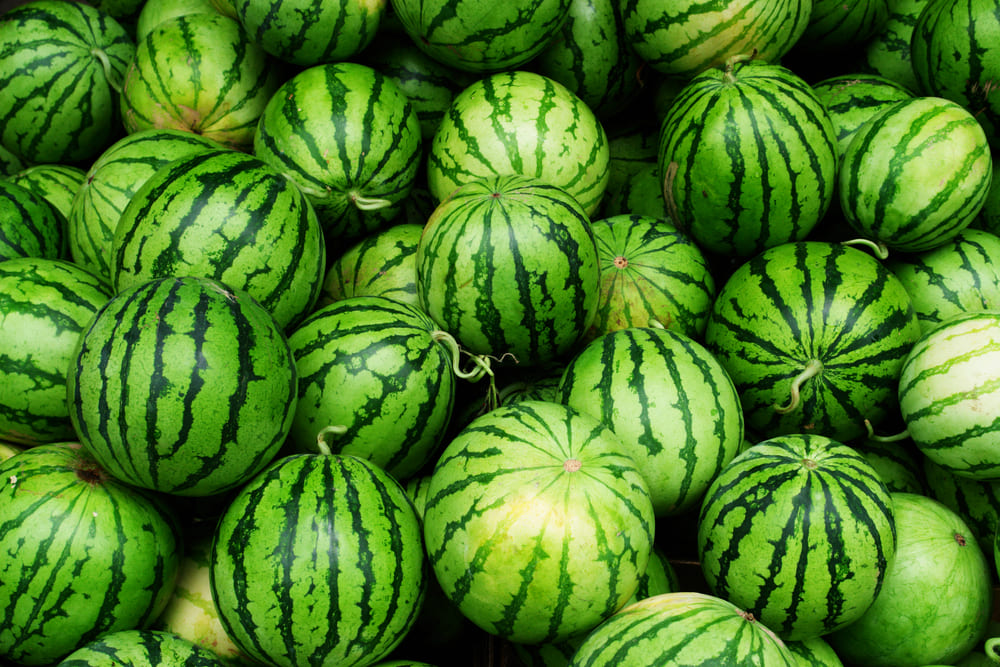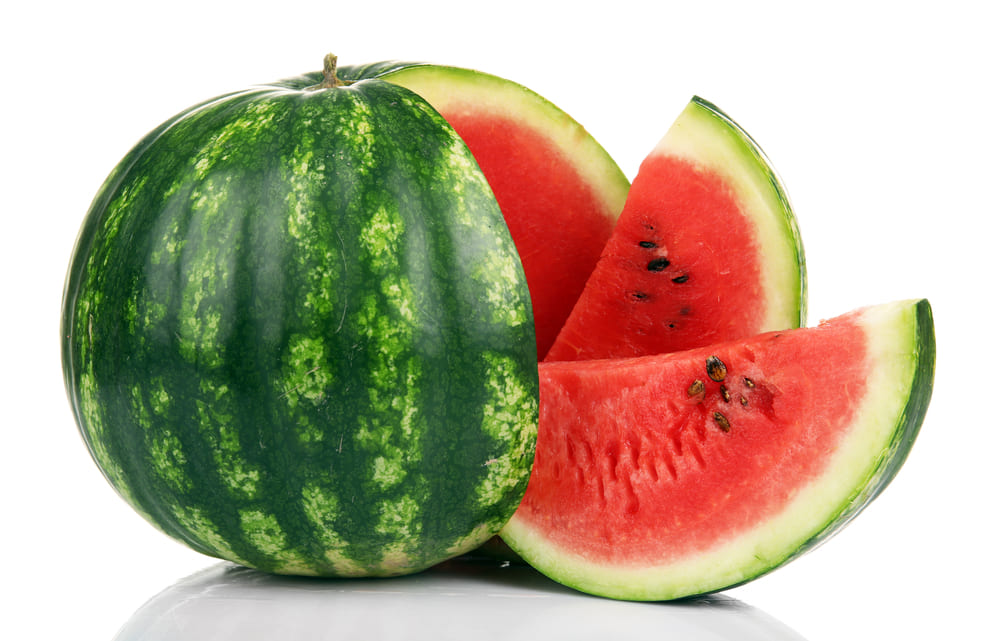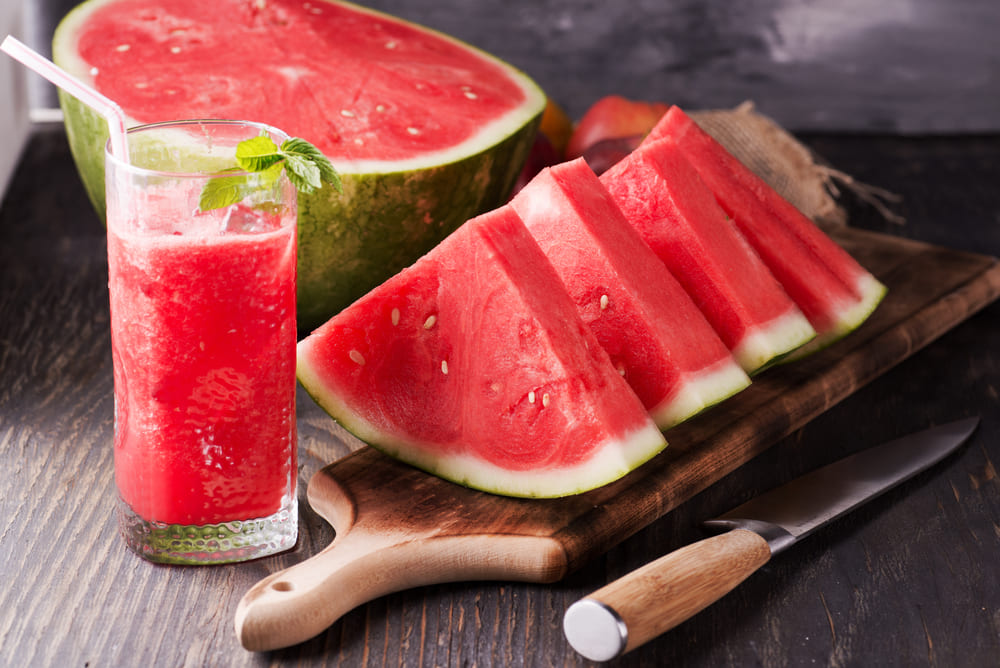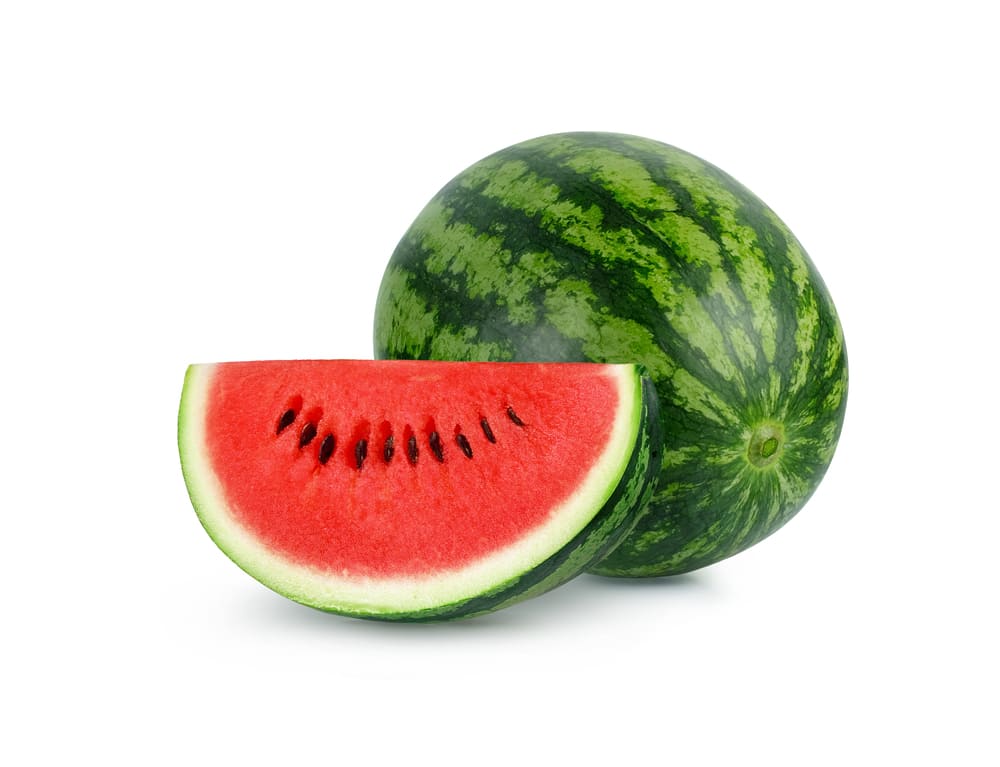The average weight of a watermelon is about 20 pounds.There are many factors that determine the weight of a watermelon. The soil it grows in, the pollination process and the weather are all important. Some varieties are heavier than others, but To determine the weight of a watermelon, you can use a weighing scale.

What’s The Average Watermelon Weight?
Large watermelons are a great choice if you are planning to share the fruit with a large group of people. A 20-pound watermelon is enough to feed around 35 people. However, some varieties can weigh more than forty pounds. The Jubilee, for example, can weigh over 35 pounds. It is a variety of watermelon with a light green skin and darker stripes. It is about twenty-four inches long and contains bright red flesh. According to the Guinness book of records, the largest watermelon ever grown weighed 350.5 pounds.
Medium-sized watermelons are about ten to twenty pounds. The smallest watermelons weigh about eight pounds. A twenty-pound watermelon will yield 66 wedges. A wedge yields approximately one pound of flesh. Therefore, a twenty-pound watermelon can feed about 33 people if it is quartered. Similarly, a five-pound watermelon can serve six people.
While watermelons vary in size and weight, they all have the same general characteristics. A typical supermarket watermelon weighs approximately 14 pounds and is ten inches in diameter. Depending on the type of seed used and the care given to the plant, the average watermelon can weigh anywhere from 20 to thirty pounds.
Watermelons are a summertime favorite that are full of nutrients. Their flesh is almost ninety percent water and six percent sugar. They are eaten largely for their juicy pink flesh, though the rind is also edible. The seeds are also often dried and eaten as snacks.
Watermelon Varieties
There are several varieties of watermelon. These fruits vary greatly in size and weight. Some varieties are seeded and some are seedless. Seeded watermelons contain noticeable seeds but are highly nutritious. They contain omega 3 and 6 and magnesium. Seedless varieties have seedless flesh and weigh about eight to 15 pounds.
Seedless varieties come in many colors. Some are yellow, while others are orange. Some varieties are seedless, which is great if you are starting a watermelon garden. Seedless watermelons grow in seventy-five days. You can buy seeds from a local garden center or purchase them online.
Icebox watermelons are smaller than seedless watermelons. Their flesh is seedless and sweet. They range in weight from fifteen to thirty pounds and are best suited for a picnic. Their sweet flesh is firm and fine-grained. There are several varieties to choose from, including Sugar Baby and Tiger Baby. The sugar baby variety is a favorite among picnickers. It has an icebox-like shape with a deep red flesh.
UC Cooperative Extension farm advisors began evaluating different varieties in 2003. This work expanded in 2005 and involves testing up to ten varieties. The research team also looked at how the different varieties’ plant spacing and fertility requirements affected the production of the fruit. The research also evaluated the melon’s flesh color, diameter, and weight.
Seedless and seeded watermelons have similar nutritional benefits, but yellow watermelons are more sweet and often come with a seed. There are also seedless varieties that grow in the United States. These melon varieties come in many different shapes and sizes and weight five to thirty pounds.

Nutrients And Maturation
The watermelon contains phytochemicals that can inhibit the formation of reactive oxygen species (ROS), which can be harmful to the body. The presence of these compounds enhances watermelon’s use as a functional ingredient in food. The phytochemicals found in watermelons have many beneficial effects on human health.
Watermelons are tropical plants that require temperatures of at least 77 degrees Fahrenheit to thrive. They are popular in the northern U.S. and other countries with hot climates, and have become an essential part of the summer barbecue. The watermelon’s hydrating qualities make it an ideal choice for people who are suffering from dehydration.
Watermelon is rich in fiber, which can help support digestive health. Fiber provides bulk in the digestive tract, which helps keep bowel movements regular. It is also high in water, which helps keep food moving through the digestive tract. Watermelon also contains lycopene, a phytonutrient that gives fruits and vegetables their red hue. This antioxidant may help to prevent cancer.
A watermelon is a refreshing, healthy snack that is high in vitamins and minerals. Compared to other fruits, it contains only a few calories. It is an excellent source of dietary fiber, antioxidants, and lycopene, and may help lower blood pressure. It is also beneficial for the skin, digestion, and metabolism.
Research has shown that watermelon is high in antioxidants. These nutrients are responsible for protecting the body against the damaging effects of free radicals. Antioxidants can protect cells from chronic conditions, such as heart disease and diabetes. In addition, they may improve brain health and protect the body against certain types of cancer.
Small Watermelon Average Weight
Watermelon is a fruit with high water content. About 90% of the weight is water. A 100-gram serving contains 30 calories. This fruit also contains the amino acid arginine, which aids in fat burning. To get the most out of your watermelon, choose a firm variety. You can test its texture by tapping it. It should make a hollow sound when tapped. This means the fruit is firm and stable.
A watermelon’s weight is determined by two factors: its genetic make-up and environmental conditions. Watermelons that are grown in a favorable climate will grow larger and weigh more. In contrast, watermelons that are grown in unfavorable environments will be small. This can affect their taste, so it is important to choose a watermelon that is healthy and does not have a bad taste.
There are several varieties of small watermelons, with average weights of between one and ten pounds. These are ideal for smaller gardens and require less space to grow. They can also be eaten by one family. Sunshine, for example, weighs two to four pounds, while Sorbet weighs five to seven pounds.
Watermelons can range in size and weight, with traditional varieties weighing more than 25 pounds. Baby watermelons are smaller and weigh six to eight pounds. However, if you buy a melon that is six to ten pounds, you can expect it to grow larger, and weigh more.
Despite the fact that watermelons are a popular and delicious fruit in the summertime, they can also be intimidating to cut. For a party, a twenty-pound watermelon will feed about thirty-three people, while a five-pound watermelon will serve about six to eight. Choosing the right size melon for your party will ensure you have enough for guests and not waste money.
Medium Watermelon Weight
The average weight of a medium watermelon is about ten pounds, but it can range up to twenty pounds. There are many varieties of watermelons, and the weights of the different varieties vary considerably. For example, the Grey Bell watermelon weighs thirteen to eighteen pounds. Its perfect round shape, green skin with a grayish tint, and bright red flesh makes it very juicy.
The weight of a watermelon is important for determining the price of the fruit and to determine the proper amount to eat each day. Stores use simple scales for this purpose. Alternatively, you can purchase a home scale to weigh watermelons, particularly if you’re growing them in your own yard. There are several factors that affect the weight of a watermelon, including the variety, size, and maturity.
A medium-sized watermelon contains about 45 calories, most of which come from carbohydrates. It has a low fat content, and the fruit is high in antioxidants. One study found that watermelon contains a significant amount of lycopene, a powerful antioxidant that reduces the risk of cancer and cardiovascular disease.
While watermelon is best eaten fresh, it can be stored for up to five days. For later use, it can also be frozen. However, the watermelon will lose its crispness if stored for a long time. For a delicious snack, you can top it with yogurt, mint, slivered almonds, berries, and even olive oil. If you’re a fan of roasted seeds, you can roast the seeds of the fruit with olive oil and enjoy them with your favorite food.
Large Watermelon Weight
The weight of a large watermelon varies depending on the variety. Some varieties weigh more than one hundred pounds, while others are less than two pounds. The weight of watermelons also depends on the type of soil and pollination they received. In addition, watermelon weights can be affected by genetics.
The average weight of a large watermelon is between 20 pounds and 25 pounds. There are over fifty varieties of watermelon, which vary in size, flavor, and color. The average melon weighs around 16 inches in diameter and weighs between twenty-five to fifty pounds. Some varieties are even bigger than this.
The heaviest watermelon in history was weighed by a farmer from Tennessee named Chris Kent. He grew the watermelon in Sevierville, Tennessee, and verified its weight with the Great Pumpkin Commonwealth in Hamilton, Ohio, on 4 October 2013. The comments below may relate to the previous record holders.
Apart from being high in water content, watermelon is also packed with nutrients. It is a good source of antioxidants, which help remove reactive species in the body. Free radicals are produced naturally during metabolism, but can also be produced by smoking, air pollution, and stress. Too many free radicals can damage cells and cause various diseases. Therefore, dietary antioxidants are essential for the removal of these harmful radicals.
In order to cut a watermelon into manageable chunks, you must first cut the rind. The rind begins as a thin green layer and turns white when near the flesh. It does not have much flavor, and can be cut away with a sharp chef’s knife.

Factors That Influence a Watermelon’s Weight
The weight of a watermelon depends on its size, age, and nutritional content. Watermelons should be heavier than their appearance and should be firm to the touch. Denser watermelons contain more water, which results in a sweeter taste. Round watermelons are generally sweeter than oval ones. When choosing watermelons, try to buy them in season.
The weight of a watermelon can vary greatly based on the variety and environment. Some varieties can weigh as little as one pound, while others can weigh up to 200 pounds. In addition to weather and genetics, there are also other factors that can affect weight.
Watermelons are generally heavier than other fruits because they contain a high water content. While this is a disadvantage, it also means that watermelons are low in calories. When choosing a watermelon, you should pick the heaviest one for its size. It is also important to look for a yellow spot on the melon, as this means it rested on the ground before harvest. If the spot is large, it indicates that the watermelon spent a long time ripening.
Watermelons also vary in weight based on their size and genetic makeup. Watermelons need the right amount of sunlight and rainfall to grow properly. If the weather conditions are favorable, watermelons will grow larger. However, a watermelon that has not been properly nourished will be smaller.
Consuming watermelon is an excellent way to increase your potassium intake, reduce your intake of saturated fat, and improve your overall health. Additionally, watermelon can also improve your blood lipid profile, which is beneficial for weight management.
How Many Pounds of Watermelon Per Person?
Watermelon is a delicious, nutritious, and hydrating fruit. A one-cup serving contains more than half a cup of water, fiber, and several essential nutrients. Ideally, you serve the fruit chilled and with its rind on the bottom. A 20-pound watermelon will serve approximately 33 people. However, if you’re only serving one or two people, a five-pound melon will be enough to feed six people.
The weight of a watermelon varies depending on its variety, size, and color. Typical supermarket melons are about 16 inches long and 10 inches in diameter, but there are also smaller and larger varieties that weigh a bit more. A weighing scale can help you figure out how much watermelon you’ll need per person.
Approximately 50 calories are contained in each serving of watermelon. Most of the calories come from carbohydrates, which are the main source of energy in the body. The remainder comes from a tiny amount of fat and protein. Watermelon is a perfect fruit to eat during summer.
Watermelon is grown worldwide and has more than one hundred varieties. In the United States, the majority of watermelons are grown in Texas, California, and Georgia. One-quarter of the crop is imported from Central and Mexico. However, this is only a percentage of the crop, and many farmers have a much higher production potential.
Watermelon volume is influenced by the popularity of pre-cut fruit and the rise of grab-and-go products. Watermelons are often sold in shipping bins to help attract shoppers. These bins provide a portable display and can be strategically placed throughout the store.

The Heaviest Watermelon to Date
The heaviest watermelon to date was grown by Chris Kent in Sevierville, Tennessee. The melon weighed 350.5 pounds, or 159 kilograms. It is 14 times heavier than an average supermarket watermelon. Although watermelons are not a popular fruit in the United States, their weight is impressive.
Watermelons are notoriously heavy fruits. Though most homegrown varieties fit in the palm of your hand, they can weigh hundreds of pounds. In 2013 Chris Kent of Sevierville, Tennessee, produced the heaviest watermelon on record. Though watermelons are heavy fruit, they have only about 80 calories per two-cup serving. This means a melon can feed up to three dozen people.
Watermelons are one of the healthiest fruits available, as 92% of their weight is water. One cup of diced watermelon has 46 calories, and can be a good alternative to sugary and high-calorie foods. In fact, the heaviest melon ever grown weighed 350.5 pounds. It is an excellent source of lycopene, which is known to reduce cancer risk. The Japanese have even perfected the art of growing watermelons that are square.
There are two ways to break the world record for the heaviest watermelon. You can either crush the melon with your hands or with your head. However, if you’re using your head, you can smash up as many watermelons as you can in one minute. Currently, Tafzi Ahmed holds the world record for crushing the most watermelons in a minute with his head. He did this while raising money for the Make a Wish Foundation.
The largest watermelon to date weighed 350 pounds. However, watermelons vary in size, flavor, and appearance. Some are smaller than others, while others weigh as much as 500 pounds.
Conclusion
The answer to the question of how much a watermelon weighs may surprise you. These juicy fruits have been known to weigh from one to two hundred pounds. However, the weight of a watermelon will vary depending on the variety and type you choose. A medium-sized watermelon can weigh between ten and twenty pounds. The weight is primarily due to its water content, which is around sixty percent of the watermelon’s weight.
The weight of a watermelon depends on several factors, including size, age, and genetic makeup. A smaller watermelon will be lighter than a mature one, and vice versa. Its weight also depends on the growing environment, as some watermelons do not grow well in certain environments.
The rind of a watermelon contains 77 different volatile compounds. Of these, 56 are found in the rind. The amount of citrulline in the rind is nearly two times higher than that of the flesh. In addition, the amount of arginine in the rind is nearly five times higher than in the flesh. However, the amount of essential amino acids is considerably lower compared to the flesh.
Watermelon’s low-calorie content makes it ideal for dieters who want to lose weight. The fruit’s high water content keeps the body hydrated and prevents cravings between meals. The low-calorie content also helps to control portion sizes. One caution when eating watermelon is that it is acidic and may delay digestion.
